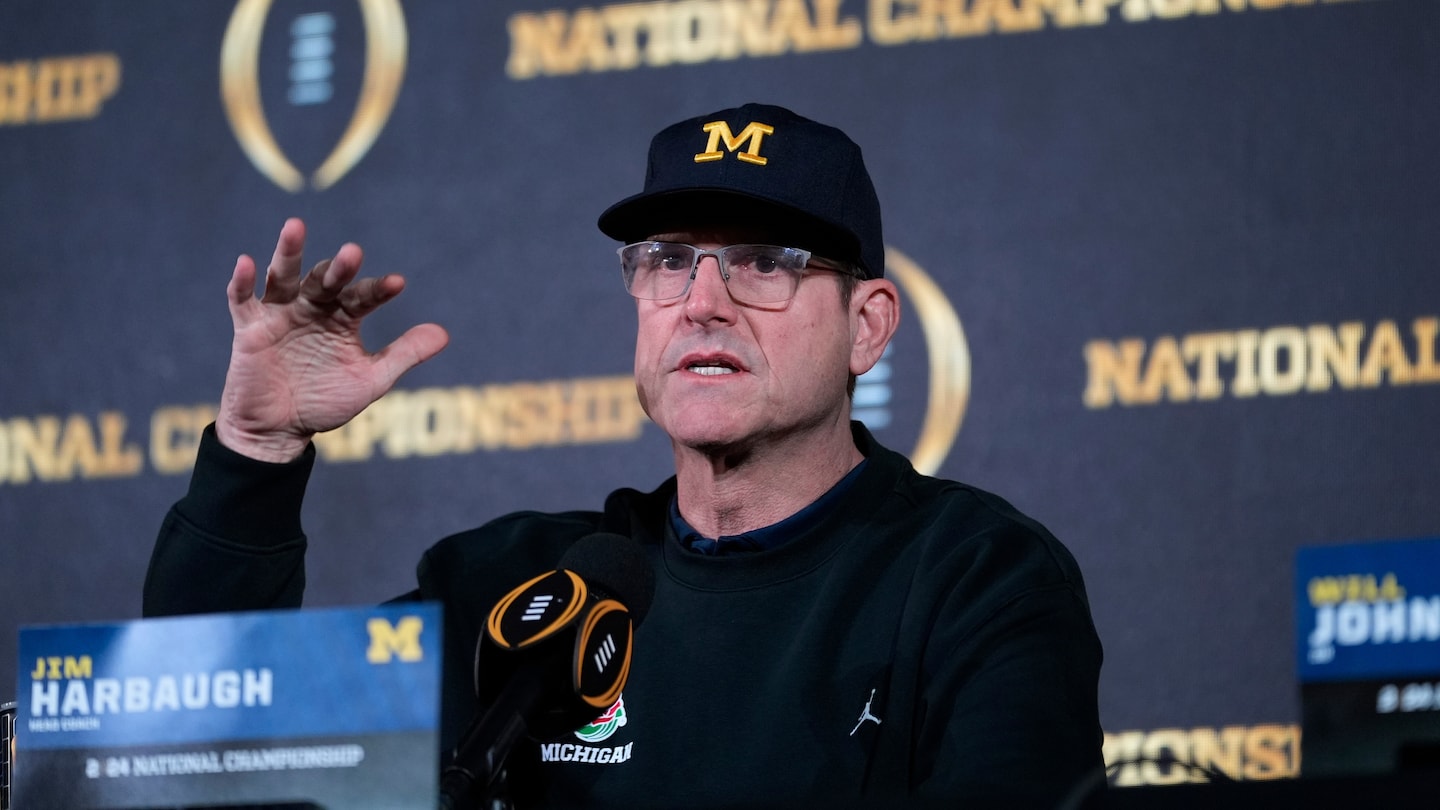Harbaugh talked about how college football players deserve a cut of the enormous and growing television revenue reaped by schools and conferences on the backs of the players’ labor. In these early years of the name, image and likeness (NIL) era, he talked about the next steps, about potential collective bargaining and the need for college athletes to organize. He even talked about taking a lower salary to help make revenue sharing happen.
But now that he is set to be introduced Thursday as coach of the NFL’s Los Angeles Chargers, he probably won’t talk about all of this anymore — at least not much. And the legacy of his aggressive push for revenue sharing could be shaped by whether other prominent coaches pick it up.
“I was discouraged when I heard he was leaving for the NFL, just because of the progress that he’s brought since his first rant [on revenue sharing],” said Jim Cavale, founder of athletes.org, a players association for college athletes that counts revenue sharing as a main cause. “… He’s a catalyst for it, and I think other coaches will continue to take that message forward.
“They’re learning it would be better for the money that the athletes generate for the schools to be paid to the athletes in a transparent manner with some structure around it, such as minimums and maximums and a pool for athletes who emerge and play more by the end of the year. Maybe commitments for athletes to stay a certain amount of time if they get money in this way, so that there’s not a serial transferring environment.”
Harbaugh is far from the only prominent coach or athletic director to stump for a form of revenue sharing. The recently retired Nick Saban, UCLA’s Chip Kelly and Iowa’s Kirk Ferentz are some of the major conference football coaches who have made similar comments. Ross Bjork, who recently went from athletic director at Texas A&M to in line to fill the same role at Ohio State, discussed revenue sharing at his introductory news conference in Columbus last month. But Harbaugh’s persistence made his comments stand out.
He has long been comfortable with speaking his mind in public, whether about football, political candidates or his antiabortion views. And with revenue sharing, he took his cause to the sport’s biggest platforms, where there was the highest volume of cameras and recorders in a room. Before the Rose Bowl, before the national title game, after the national title game, his comments were splashed across social media, the water cooler of our time. Jim Harbaugh was everywhere, and not because of a sign-stealing scandal or recruiting violations.
“Jim doesn’t do anything by accident,” said agent Leigh Steinberg, who represented Harbaugh during the coach’s playing career as an NFL quarterback. “He never has.”
“I tend toward a skeptical position of public statements by coaches,” said Jason Stahl, executive director of the College Football Players Association. “We’ve seen public statements a lot, particularly on revenue sharing, just isolating that issue. I am guarded about putting too much stock in those statements because it can be just a recruiting move. … Now, I think Harbaugh has been the one coach, for me, that’s been different. And particularly his comments around the national championship game, both before and after, for two reasons.
“Number one, using that type of platform, to me, it raises the stakes. It moves from rhetoric to action. … And two, he went from calling for revenue sharing to discussing unionization after the game. That is different. That is wholesale different.”
Since the national title game, the news cycle has spun fast in college sports. In January alone, Congress held its 11th hearing on NIL and the state of college sports; Florida State was punished by the NCAA for violating NIL rules; reports revealed the NCAA is also investigating Florida; and on Tuesday, in response to an NCAA investigation of potential NIL violations at Tennessee, the school’s chancellor called the current NIL rules “intellectually dishonest.”
Forget hinting at a legal battle. Tennessee’s sharp defense all but guaranteed one, and then attorneys general from Tennessee and Virginia filed a federal lawsuit Wednesday, saying the NCAA’s NIL rules violate antitrust law. Tennessee Athletic Director Danny White and Gov. Bill Lee (R) threw their weight behind the effort. All at once, the NCAA faces legal challenges that could make athletes employees, allow them to unionize and allow them to negotiate and sign NIL deals during the recruiting or transfer process without fear of repercussions. And when advocates reflected on Harbaugh’s support of revenue sharing, the courts came up a lot.
Jordan Acker, a member of Michigan’s Board of Regents, said he believes Harbaugh saw the NCAA and college football at a crossroads: Figure out a new model — and fast — or cede all control to federal judges.
“Jim Harbaugh leaving college football is a tremendous loss in this particular arena,” said Acker, who last fall wrote a New York Times op-ed pushing for revenue sharing in college sports. “Because of his authority on this topic, having been both a star college athlete, a star coach at the pro and college level, but also as someone who’s not afraid to speak his mind and be thoughtful … I fear that it is a loss that will actually make conversations about where we need to go when it comes to revenue sharing harder.”
Having known Harbaugh since he was a college athlete, Steinberg predicts he will stay interested in revenue sharing and college football reform. Harbaugh would often ask Steinberg what he was reading or what books he was recommending to friends. They would chat about politics or religion — conversations that Steinberg didn’t have with other clients. One of Harbaugh’s coaching superpowers is a single-minded focus on the field or inside his team’s facility. But Steinberg always felt Harbaugh could apply that ability throughout his life.
In Los Angeles, though, it would probably take a reporter randomly bringing up revenue sharing in the middle of an NFL game week. College football will no longer be near the top of Harbaugh’s mind. Instead, a critical discussion will shift to other coaches, who will decide whether they want to be the face of what’s coming one way or another. Then, the Harbaugh Effect will materialize.
“He gave cover for coaches and athletic administrators to also talk about the issue,” said Mit Winter, an NIL lawyer based in Kansas City, Mo. “He’s a pretty outspoken guy, obviously, and he wasn’t in a situation where if he voiced his opinion, his job was going to be put on the line. So it’s maybe a bit different of a scenario for some other coaches.”


 Best Underground Water Leak Detection Equipment 2024
Best Underground Water Leak Detection Equipment 2024  Best Backyard Ideas: Turn Your Outdoor Area Into a Creative and Calm Haven
Best Backyard Ideas: Turn Your Outdoor Area Into a Creative and Calm Haven  Babar, Rizwan are good players but not whole team, says Mohammad Hafeez
Babar, Rizwan are good players but not whole team, says Mohammad Hafeez  Pak vs NZ: Green Shirts aim to bounce back against Kiwis today
Pak vs NZ: Green Shirts aim to bounce back against Kiwis today